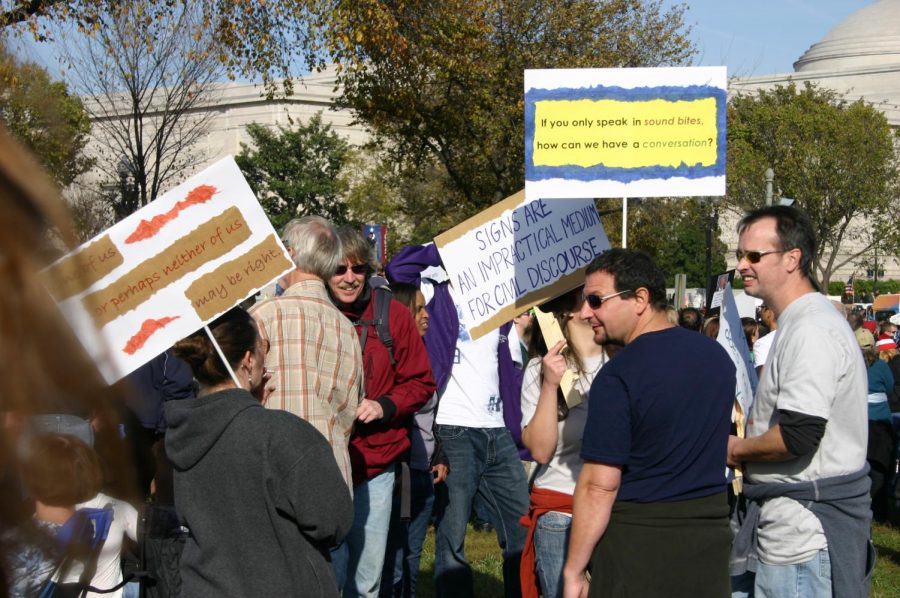Sutton: Why civil discourse is the only way forward
Ryan Somma from Occoquan, USA [CC BY-SA]
Civil discourse in layman’s terms is the ability to have a civil and respectable conversation.
February 13, 2020
Who does not love a good and heated argument? Warriors of speech and debate having it out for everyone to see, in hopes of changing a point of view. Facts are checked, arguments are strengthened, and alliances are often tested through the use of the democratic process. This way of solving disagreements has been in use since democracy came to be in Greece and is still used in democratic governments across the world today. While this is a fair and just way to debate issues, the lines can often get blurred on whether it is the stances or the people that are arguing. More often than not these debates seem to become discouraging of the reasonable ideology that it seems to claim. With this in mind the question that comes forth is simply,“What is civil discourse?”
Civil discourse in layman’s terms is the ability to have a civil and respectable conversation. The ability to have civil conversation is the cornerstone of Democratic society, and is representative of how laws and policies are affected by it. Civil discourse is factual and involves both listening and speaking. Civil discourse does not attack a singular person, nor does it attempt to assume the point of view of its participants. Finally, the true measure of civil discourse lies in the productivity found within. If nothing comes out of a conversation then it was, in a sense, worthless. Now this does not mean a conversation means nothing if neither side wins, but rather a conversation is truly fruitful if both sides leave with a better understanding of one another.
Now that we better understand what civil discourse is, the total dysfunction of our society can better be understood. The truth of the matter is that people have forgotten how to speak to one another politely, or just do not care enough to try. Many would rather roast someone online or curse them out in person, instead of actually attempting to move conversation forward. Remember reader, your opinion is your own, but there are ways to share that opinion without hurting everyone around you. Insulting someone based on their opinion does not show your massive intelligence, but rather exposes your lack of an argument.
No better example of this lack of civil discourse is there than our very own United States Government. Amidst impeachment trials, torn up speeches, and coming elections, it seems that our politicians have forgotten how to effectively communicate. Mudslinging is rampant and it seems as if every politician has a dirty name for every other politician. Do nothing Congress, Most Corrupt President, Racist, Sexist, Homophobic; all different names and slurs that are thrown around the capital in response to different arguments. These terms can be used in the correct sense to a person’s characteristics, but, more often than not, these terms are used to demoralize political figures to stop their movements. The funny thing is that these people were never meant to be enemies. Party lines have become battle fronts, and these marks in the sand effectively destroy any type of compromise.
So what do we do to fix these communication problems? Well, in my opinion, we need to remember that communication is a two way street. Civil discourse does not just include speaking your opinion, but it also includes listening. We have forgotten what it is like to listen to each other, and opinions that are not preferred are censored and expunged from our moral record. We, like our politicians, ought to remember that as Americans we are all on the same side. Each and every person is just trying to do what they think is right, but only together can we achieve what we seek as a whole. America is a big country, with even bigger dreams, but these large aspirations will never come to fruition without compromises that are just as big. Until then, we will continue to be what we have become; a disjointed land of people who cannot effectively communicate.










Heath Stevens • Feb 14, 2020 at 9:14 am
Here, here (or “hear, hear”)!